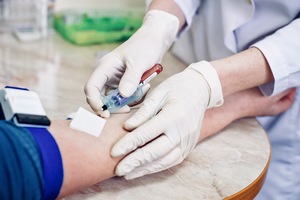Vitamin D Testing
A vitamin D test can tell you whether you are getting enough vitamin D to stay healthy. If your vitamin D levels are too low, you can work with your doctor to increase your vitamin D intake and reduce your risk for bone disorders and other related medical conditions.
Who should get a vitamin D test?
You may benefit from getting a vitamin D test if you have a bone disorder or health condition that prevents your body from absorbing calcium. A vitamin D test can help reveal whether low vitamin D levels contribute to your condition, according to the National Library of Medicine (NLM). You may also need this test if you are taking steps to increase your vitamin D levels and your doctor wants to check your progress.
According to the NLM, health conditions that may require you to get a vitamin D test include:
- Low bone density
- Osteoporosis
- Osteomalacia, which is softening of the bones
- Rickets, which is softening and weakening of the bones in children
- Bone pain
- Weakness or aching in the muscles
- Soft bones
- Weak bones
- Fractures (broken bones)
- Deformed bones
According to the NLM, you should also consider getting a vitamin D test if you are at high risk for developing a vitamin D deficiency. This includes people who:
- Are aged 65 years and older—as you age, your skin starts losing its ability to make vitamin D from sunlight.
- Get little exposure to sunlight due to spending lots of time indoors, using sunscreen, or living in places where there is little sunlight.
- Have dark skin—the bodies of people with darker skin tones make less vitamin D from sunlight.
- Have had weight-loss surgery. Some forms of weight-loss surgery, such as gastric bypass surgery, cause the intestine to absorb fewer calories and nutrients, and this can often lead to nutritional deficiencies, including in vitamin D, reports the NLM.
- Are obese.
- Have a condition that makes it difficult to absorb nutrients from foods. Examples of such conditions, according to the NLM, include celiac disease, Crohn’s disease, and ulcerative colitis.
- Have a disease that affects the ability to convert vitamin D into a form that the body can use. Examples of such conditions include kidney disease and liver disease.
- Take certain medications that reduce your vitamin D level.
- Do not get enough vitamin D from the foods they eat.
Talk to your healthcare provider if you are not sure whether you can benefit from a vitamin D test. Your doctor can review your medical history and evaluation to determine whether you may need this test.
How to get a vitamin D test
Vitamin D testing is offered in a variety of healthcare settings. Ask your healthcare provider if it offers vitamin D testing or if it can refer you to a specialist who can perform this test. Many walk-in clinics, labs, and urgent care centers may also offer this test without requiring a referral.
An easy way to find out how and where to get a vitamin D test is to use Solv. Solv gives you a list of all nearby providers that offer this test, along with contact information so you can ask the provider what is required of you if you want this test. Solv also gives you the ability to book an appointment directly from its website.
Why is a vitamin D test important?
Vitamin D is essential to maintaining healthy bones and teeth. This vitamin can also help your muscles, nerves, and immune system work as they should, adds the NLM.
A vitamin D test is important because it can tell you whether your body needs a higher amount of this vitamin to stay healthy and reduce your risk for conditions such as osteoporosis. If your vitamin D levels are too low, you can work with your doctor to find ways to increase them. For example, your doctor can evaluate your current diet to see whether you should be eating higher amounts of vitamin D foods such as eggs, milk, and fatty fish.
What happens during a vitamin D test?
A vitamin D test is performed as a blood test, says the NLM. During this test, a healthcare worker will use a tiny needle to draw a small sample of blood from a vein in your arm. Then, your sample is sent to the lab, where it is evaluated to determine the measurement of 25(OH)D in your blood. According to the NLM, your liver converts vitamin D into a substance called 25 hydroxyvitamin D, also known as 25(OH)D.
During this test, you may feel a slight sting in your arm when the needle goes in and out. The NLM adds that a vitamin D test can usually be performed in under five minutes.
What do results mean from a vitamin D test?
Results from vitamin D tests are reported in numerous different ways, says the NLM. Your results may be broken down by levels of vitamin D2 and vitamin D3, or results may show your total amount of vitamin D, which is the sum of vitamins D2 and D3.
If you are deficient in total vitamin D, it means you may not be getting enough vitamin D in your diet or that you are not getting enough sunlight exposure. According to the NLM, low vitamin D levels could also mean your body has difficulty absorbing vitamin D from foods and supplements or that your body has difficulty converting vitamin D into 25(OH)D. These issues may indicate you may have a malabsorptive disorder or liver or kidney disease, notes the NLM.
Treatment for vitamin D deficiency usually involves making changes to your diet, so you consume a higher amount of this vitamin. It may also involve taking quality vitamin D supplements, which may be safer than spending more time in the sun given how this behavior may cause skin cancer, reports the NLM.
If your total vitamin D level is abnormally high, you may be taking too many vitamin D supplements or taking doses that are too high. According to the NLM, having high vitamin D levels can eventually damage your organs and blood vessels.
Talk to your doctor or the vitamin D testing provider if you need help understanding or interpreting your results. These healthcare professionals can talk to you in greater detail about what your results mean, and about what might happen next based on whether your vitamin D levels are too high or too low.
Find Vitamin D Testing near you
- Alabama
- Alaska
- Arizona
- Arkansas
- California
- Colorado
- Connecticut
- Delaware
- Florida
- Georgia
- Hawaii
- Idaho
- Illinois
- Indiana
- Iowa
- Kansas
- Kentucky
- Louisiana
- Maine
- Maryland
- Massachusetts
- Michigan
- Minnesota
- Mississippi
- Missouri
- Montana
- Nebraska
- Nevada
- New Hampshire
- New Jersey
- New Mexico
- New York
- North Carolina
- North Dakota
- Ohio
- Oklahoma
- Oregon
- Pennsylvania
- Rhode Island
- South Carolina
- South Dakota
- Tennessee
- Texas
- Utah
- Vermont
- Virginia
- Washington
- Washington DC
- West Virginia
- Wisconsin
- Wyoming
Vitamin D Testing FAQs
How do I prepare for a vitamin D test?
A vitamin D test requires no special preparation, says the NLM. You may want to consider wearing a short-sleeved t-shirt or fewer layers of clothing so the testing provider can easily access a vein in your arm from which to draw a blood sample.
What are other names for a vitamin D test?
A vitamin D test is also known as a 25-hydroxyvitamin D, 25(OH)D, vitamin D2 test, vitamin D3 test, cholecalciferol test, ergocalciferol test, or calcidiol test, says the NLM. If you are unfamiliar with these tests, ask the provider to confirm whether you are getting a vitamin D test.
Are there any risks to having a vitamin D test?
A vitamin D test is performed as a blood test, which comes with very few risks, reports the NLM. It adds that you may experience slight pain or bruising at the needle insertion site but that these symptoms usually go away quickly.
What can affect my vitamin D test results?
Certain medicines, vitamins, and nutritional supplements may affect your vitamin D test results, reports the NLM. It suggests telling the testing provider whether you are taking any of these before your test.
How much vitamin D does my body need?
According to Harvard Medical School, the recommended vitamin D intake is 400 IU/day for infants, 600 IU/day for children aged one to 13, 600 IU for people between the ages of 14 and 70, and 800 IU for those aged 71 and older.
What are the signs of vitamin D deficiency?
Signs of vitamin D deficiency and low vitamin D include fractures, loss of bone density, and osteoporosis, reports the NLM. If you think you may be deficient in vitamin D, make an appointment with a vitamin D test provider to have your levels checked.
What is the cost of a vitamin D test?
The cost of a vitamin D test depends on several factors, such as whether the test is covered by your health insurance plan and fees set by the testing provider. Ask the provider directly to find out how much your vitamin D test will cost.
Solv has strict sourcing guidelines and relies on peer-reviewed studies, academic research institutions, and medical associations. We avoid using tertiary references.
Everyday Healthcare, Simplified
Expert advice to help you live your best life

 LinkedIn
LinkedIn
